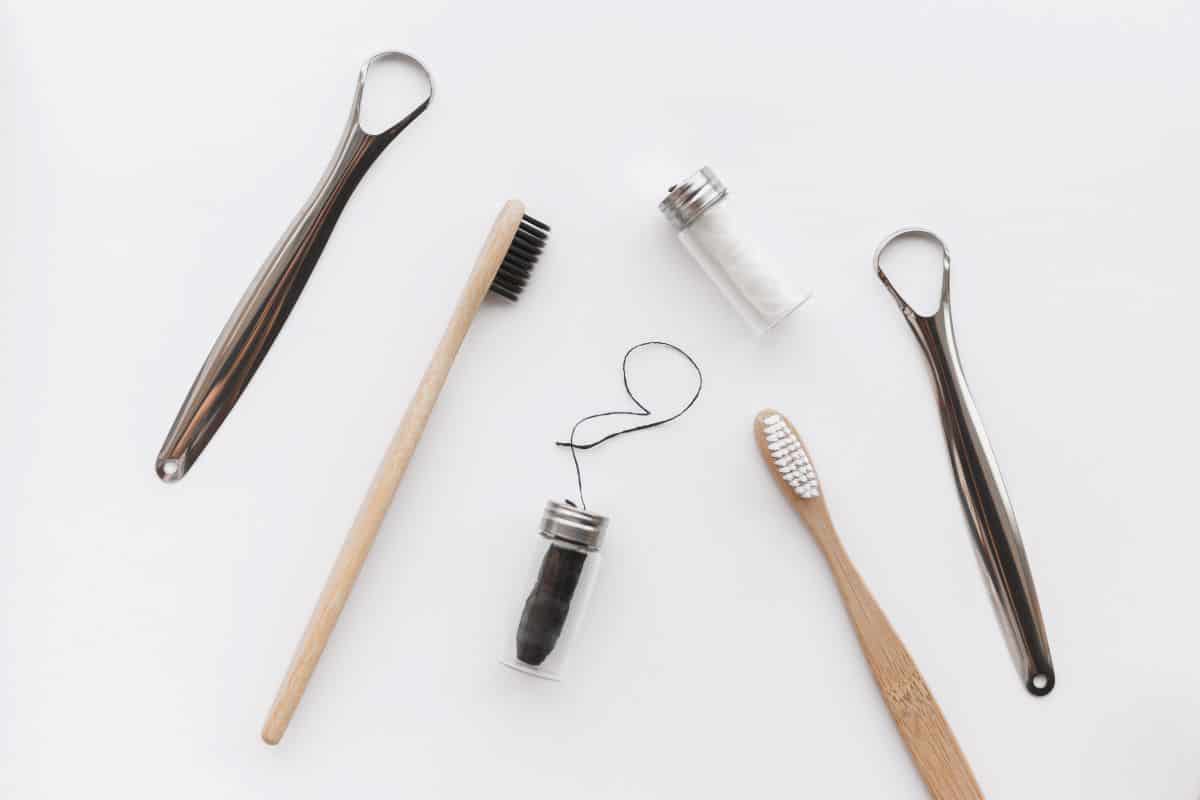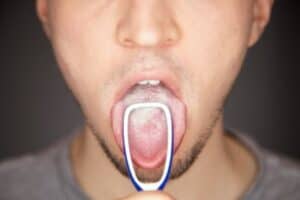
26 Apr What is Tongue Scraping and Is It Effective?
What is Tongue Scraping and Is It Effective?
Tongue scraping is a somewhat controversial subject in the dental world, as many people have misconceptions about its use and efficacy. Ultimately, there is nothing to lose by doing it, and potentially a lot to gain.
Tongue scraping is an oral hygiene technique that involves using a metal or plastic tool to gently scrape away bacteria and debris from the surface of the tongue. It can help remove bacteria, food particles, fungi, and dead cells that accumulate on the tongue throughout the day, helping to keep one’s mouth clean and fresh, and may also aid in preventing bad breath.

Can you Give Me Details About Tongue Scraping and Its Effectiveness?
The act of tongue scraping involves the use of a tool to remove bacteria, food particles, and debris from one’s tongue. This practice dates back thousands of years and has been done by various historical figures, including the Romans, Victorians, and even George Washington.
- Although brushing one’s tongue while brushing their teeth can achieve a similar result, some experts recommend using a dedicated scraping tool for better results in removing plaque and bacteria.
- Some people think that tongue scraping can solve bad breath, also known as halitosis. But the truth is, scraping your tongue only removes some of the bacteria that cause bad breath, and these bacteria can quickly multiply again after you eat or drink.
- However, if you use the scraper regularly after every meal, it can help reduce bad breath in the long run. The more consistent you are with using it, the better the results.
Another common misunderstanding is that brushing one’s tongue with a toothbrush is equally effective as using a tongue scraper; however, according to recent studies, this isn’t true.
- Researchers found that using a tongue scraper removed 30% more volatile sulfur compounds (which smell like rotten eggs) than soft-bristled toothbrushes.
The Benefits Of Tongue-scraping?
Tongue-scraping has benefits beyond just removing bacterial plaque:
Sense Of Taste Is Improved
According to some studies, using a tongue scraper twice a day can enhance your sense of taste. This is because the removal of bacterial plaque from your tongue helps your taste buds differentiate between different tastes, such as salty, sweet, bitter, sour, spicy, and umami.
Improves The Appearance of Your Tongue
If you see a white or yellowish discoloration on your tongue, it could indicate the buildup of debris. Try scraping off the debris to prevent or reduce the discoloration.
Harmful Bacteria Removed
Researchers discovered that using a tongue scraper twice a day for seven days led to a decrease in the amount of mutans streptococci and Lactobacilli bacteria in the mouth, which are associated with bad breath and dental decay.
Overall Health Improved
To prevent oral health conditions such as plaque, tartar buildup, cavities, and gum disease, it is important to eliminate bacteria. Good oral health indicates overall good health, so caring for your teeth and tongue is crucial.
How Is Tongue Scraping Done?
Tongue scraping is a straightforward process. To begin, you’ll need to purchase a tongue scraper online or from your local pharmacy. Start by performing your regular teeth brushing and flossing routine. After that: :
- Stick out your tongue—you may need to use a mirror for this step if necessary
- Position the scraper at the back of your tongue
- Pull the scraper forward while applying gentle pressure
- Rinse off the debris that has accumulated on the scraper
- Repeat up to three times per scraping session
- It is important to use a gentle touch when performing this action and not to press too hard, as it could cause irritation or injury.
Additionally, it is advised not to scrape too often, as this could disrupt the balance of bacteria in your mouth.

Choosing the Proper Tongue Scraper
There are three types of tongue scrapers you can choose from metal, plastic, and silicone. Each of these materials offers its advantages and disadvantages.
Metal tongue scrapers are generally considered to be the most effective type for removing bacteria and debris from your tongue. There are several options that you can find online. These include:
- Brush tongue scrapers usually have a long handle similar to that of a toothbrush. The tip of the scraper has ridges or short bristles that should be dragged along the tongue. Since they cannot cover the whole tongue at once, it is necessary to pass over it several times. It is advisable to replace them every three to four months, especially if one uses them frequently.
- A plastic tongue scraper is a thin wire in a U-shaped form made of plastic.
- To clean your tongue, you can use a metal tongue scraper which is a thin, U-shaped wire. Metal ones usually last longer than plastic. You can clean your entire tongue in one pass, but you may need to make more than one pass to clean it thoroughly. Copper and stainless steel scrapers are durable and can be used indefinitely if you clean them regularly. Some people prefer copper due to its antibacterial properties. Check the package or manufacturer’s website for more information.
- If you are not sure, discuss your options with your dentist and hygienist. They can determine which type of tongue scraper is best for your needs.
Using a tongue scraper can be an effective way to reduce the buildup of bacteria and debris on your tongue, improve your sense of taste, and prevent discoloration. Make sure to use the proper technique and clean your scraper after each use. If you have any questions or concerns, contact your dentist for more advice.
Good Dental Hygiene Is More Important Than A Scraper
Tongue scraping can be an effective tool for removing plaque and bacteria, but it should not replace regular brushing and flossing. Good dental hygiene is essential to maintain a healthy mouth, so make sure you brush at least twice a day and floss daily. Additionally, visit your dentist every six months or as recommended by your dentist for professional cleaning and check-ups.
The American Dental Association says that tongue scraping is not essential for good dental hygiene. Instead, the ADA recommends these important habits for good oral health:
- Brush your teeth twice a day using fluoride toothpaste.
- Floss or clean between teeth once a day.
- Eat a healthy diet and limit sugary drinks and snacks.
- Regularly see your dentist or hygienist to prevent and treat dental issues. Talk to your dentist about how often you should come in.
Tongue scraping can be used as an additional step to help remove bacteria and food debris from your mouth. If you choose to use a tongue scraper, consider the type of material, and how often you will use it, and consult your dentist or hygienist. Following these tips will help ensure good oral health and keep your breath fresh.
Conclusion
Tongue scraping can be an effective tool for removing bacteria and debris from the surface of your tongue. Before beginning any kind of oral hygiene routine, it is important to consult with your dentist or hygienist about what works best for you. Regular brushing, flossing, and visits to your dentist are essential for maintaining good oral health. With proper care and maintenance, tongue scraping can help you keep your mouth clean and healthy.
By following good oral hygiene habits, you can keep your mouth clean and healthy. Tongue scraping is an additional step that can help you remove bacteria and debris from the surface of your tongue. It is important to use a gentle touch when performing this action and not press too hard. Additionally, it is advised not to scrape too often, as this could disrupt the balance of bacteria in your mouth. Choose the tongue scraper that is best for you and use it regularly to keep your mouth clean and healthy.




Sorry, the comment form is closed at this time.